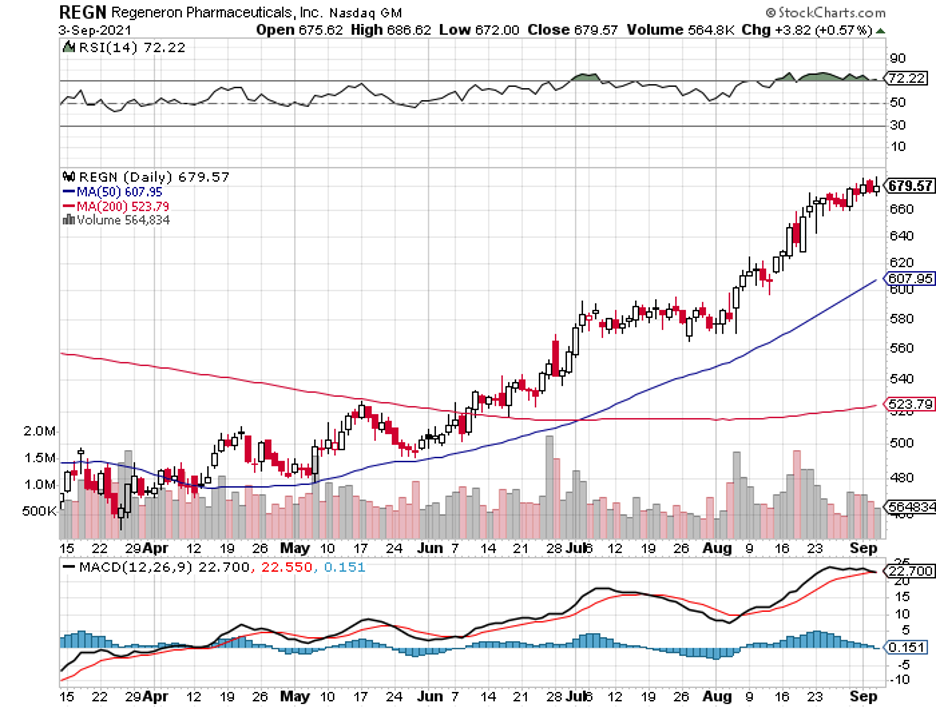A Long-Term Stock for Patient Investors
While August ushered in the end of the “dog days of summer,” with temperatures generally at their highest throughout the US, some stocks might be just starting to get warmed up this September.
This is particularly true in the biotechnology industry.
Considering that the broad market indices are reaching historic highs, the biotechnology sector, caused by its relatively low valuation, is deemed one of the appealing targets for investors who truly understand the essence of the industry and can manage the potential risks associated with it.
While not all biotechnology companies are attractive opportunities, some are great long-term investments.
One of them is Regeneron (REGN).
In fact, Regeneron is the manufacturer of a treatment projected to become the top-selling drug globally by 2030.
Annual sales of the moneymaking drug, autoimmune diseases’ medication Dupixent, could hit $21 billion by the start of the next decade—an almost fourfold jump from its current sales estimate of $5.6 billion per annum.
The projection came following Regeneron’s announcement that Dupixent can also be used to treat atopic dermatitis among children aged 6 months to 5 years old.
This makes Dupixent the first-ever biologic treatment to release positive results for that population.
Evidently, the breadth of Dupixent’s indications, complemented by the long-established safety profile of the drug, contribute to its long-term success—an achievement that’s expected to multiply and be carried over to the next decade.
While the next decade is clearly exciting for Regeneron, the company is actually performing well these days.
So far, Regeneron shares are up by roughly 40% year to date—a record-breaking rise not only for the company but also in the biotech sector.
Regeneron’s revenue skyrocketed by 163% year-over-year in the second quarter, pushing its earnings per share to leap 260% higher.
Apart from Dupixent, another catalyst for Regeneron’s impressive gains is its COVID-19 cocktail: REGEN-COV.
This treatment, albeit controversial, is anticipated to make Regeneron and its partner, Roche (RHHBY), a lot of money in the following months, especially with the delta variant wreaking havoc in the world.
Moreover, sales for all six of Regeneron’s highest-selling products, such as its eye disease drug Eylea, which it developed with Bayer (BAYN), immunology drug Kevzara, which is a product of its collaboration with Sanofi (SNY), lung cancer treatment Libtayo, and cholesterol drug Praluent, have been consistently growing by double-digit percentages.
Apart from these current treatments displaying solid sales momentum, the company also has a loaded pipeline that can easily boost Regeneron’s revenue streams in the future.
In terms of the new products under development, Regeneron has partnered with Intellia Therapeutics (NTLA), one of the leaders in the CRISPR-Cas9 gene-editing sector, to come up with next-generation treatments.
Aside from developing new products, Regeneron is expanding the indications of its top-selling drugs. Just like its efforts with Dupixent, the company is also working on expanding Libtayo’s indications.
So far, Regeneron has been working to turn Libtayo into a go-to treatment for skin cancer.
This effort could open up new avenues for Regeneron, as at least 9,000 cases of skin cancer are recorded in the US annually.
Of these, approximately 3,200 fall under the category that the company is targeting for Libtayo’s expansion.
This is a strategic move if Regeneron has any hope to dethrone the most dominant players in this competitive immunology market: Merck’s (MRK) Keytruda and Bristol-Myers Squibb’s (BMY) Opdivo.
Looking at the average net price of Libtayo, which is at $130,000 per year, the expected sales for this drug could grow to $400 million by 2026 in the US alone and roughly $700 million worldwide—and these are only for the approved indications of the drug.
In addition to its current applications, Regeneron is also working to gain approval for Libtayo to be used for cervical cancer.
Overall, Regeneron is an excellent investment for patient buy-and-hold investors. Its current portfolio of products is performing well, while its pipeline programs and partnerships offer promising growth potential.


